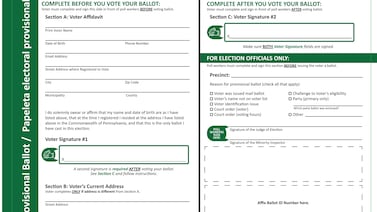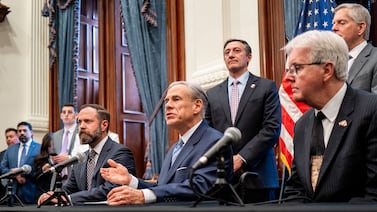Votebeat is a nonprofit news organization reporting on voting access and election administration across the U.S. Sign up for our free newsletters here.
Arizona voters will begin voting Feb. 21 for their choice of presidential nominee for the November ballot.
Counties will begin sending ballots out to Democrats and Republicans on the state’s early voting list and early in-person voting will begin for the presidential preference election.
This March 19 election, which political parties use to select their presidential candidates, is separate from the state’s primary election for all other federal, state and local candidates, which will happen on July 30.
Here are answers to some common questions about the election.
Q: Who can participate in Arizona’s March 19 presidential preference election?
A: Only voters registered as Democrats or Republicans can vote in this election. Voters who are registered as an Independent, with another party, or who have not declared a party can’t vote.
Voters will see one race on the ballot, for their party’s presidential nominee. Visit the Arizona Citizens Clean Elections Commission website to see the list of candidates on the ballot.
Q: When is the deadline to register to vote in this election?
A: The voter registration deadline is 11:59 p.m. on Feb. 20. Arizona residents can check their voter registration status and register to vote by visiting arizona.vote.
Q: Can voters switch their political affiliation so they can vote in this election?
A: Yes. Voters can change their political party to Democrat or Republican online through the same portal that they use to register to vote, on arizona.vote up until the registration deadline on Feb. 20.
Q: Are ballots sent out automatically for this election?
A: Yes, if you are registered as a Democrat or a Republican and you have signed up to be on the state’s Active Early Voting List, you will receive a ballot in the mail. Voters can add themselves to this list through the same portal they use to register to vote, on arizona.vote, up until the registration deadline on Feb. 20.
Counties will begin sending ballots on Feb. 21.
After the registration deadline, a voter can still request a one-time ballot in the mail for the election up until March 8 using an online request form.
Q: When is the deadline to mail in a ballot for the presidential preference election?
A: Voters should mail their ballot back seven to ten days before the election, or by March 12 at the latest, in order for it to arrive by the date of the election.
Q: Do political parties have to nominate the candidate that voters select?
A: No, they don’t have to — but it’s rare for them to buck the will of the voters. Political parties hold conventions after the election, and can nominate the candidate of their choosing. The state’s delegates then attend the parties’ national convention to represent the state’s choice.
Q: How is the presidential preference election different from the state’s primary election?
A: Arizona will hold its primary election on July 30. It is typically on the first Tuesday of August, but last week Gov. Katie Hobbs signed a bill to move up the primary this year in order to solve a problem with the state’s election calendar.
The July 30 primary will have all other federal, state, and local races.
That election is open to all registered voters, regardless of party affiliation. The state allows voters not registered with a major political party to pick which ballot they would like to use to vote — Democratic or Republican. The Libertarian and Green parties will be holding closed elections.
If non-affiliated voters want a Democratic or Republican ballot sent to them in the mail, they must choose the ballot type they would like ahead of time.
Q: Are there any proposals to change how the presidential preference and primary elections are run?
A: Yes. A group called Make Elections Fair Arizona is gathering signatures for a ballot initiative that would change the rules for voters in both elections.
For the presidential preference election, the initiative would open the election to all voters, even if they aren’t registered with a political party, allowing them to choose the ballot they would like to vote on.
For the primary election, the initiative would create an open primary system. This would place all candidates of various parties on one nonpartisan primary ballot, allowing voters to select their top candidate from a list of all candidates, no matter their political party. The top two to five candidates would move on to the general election in a method decided by the Legislature prior to the election. If the Legislature chooses to send more than two candidates to the general election, the state would need to adopt a ranked-choice voting system to determine the winner.
The group has until July 3 to collect signatures to secure a spot on the ballot in November.
If you run into any problems, we want to hear about them!
If you have any other questions or concerns about voting in Arizona, please let us know. We can be reached at az.tips@votebeat.org.
Jen Fifield is a reporter for Votebeat based in Arizona. Contact Jen at jfifield@votebeat.org.







